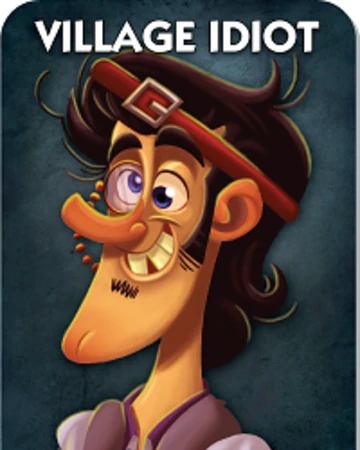A “village idiot” is a now general term, meaning a person who is well-known for being unintelligent and ignorant. This name is often used as a term of humour or endearment, rather than to ridicule or humiliate someone.
There is a lot of history behind the concept of the village idiot, and this stereotypical “stock” character appears in many plays, TV shows and films. For example, the character of the fool in Shakespeare’s works can be likened to a village idiot.
Village Idiot Meaning – What is a Village Idiot?
So what is a village idiot? A village idiot is defined as a person with low intelligence that is a resident in a village. The world-famous Mr. Bean is another great example of this type of character, along with family favourite, Homer Simpson.
If you’re interested in learning about the origins of the village idiot, and what it traditionally meant to be one, you’ll find the information you’re looking for in this article.
What Does It Mean To Be A Village Idiot?
Back in the olden days, the title of village idiot didn’t carry the same friendly, affectionate connotations that it has today. It was often used to describe someone with learning difficulties, who was well-known throughout the community for being “different”.

It wasn’t unusual for the village idiot to be ridiculed. He or she was a person that others in the community felt they could look down upon as having less intelligence than themselves. The easily impressionable village idiot was often seen as a form of entertainment.
In modern terms, this character still exists to a certain extent, although the moral values in most communities have changed.
The ridicule and torment have, thankfully, decreased. Individuals who would once have been considered village idiots are now graced with a lot more understanding, patience and support.
Village Idiot Examples
In a comedic sense, people love the ever-popular village idiot character. Some village idiot examples of this persona in popular culture are:
- Worzel Gummidge
- Manuel (Fawlty Towers)
- Joey Tribbiani (Friends)
- Trigger (Only Fools and Horses)
- Alice (The Vicar of Dibley)
- Baldrick (Blackadder)
- Dougal (Father Ted)
- Peter Griffin (Family Guy)
The list could go on, as there are many more of these characters in TV and film. In fact, almost every sitcom features at least one such role.
There are, of course, examples to be mentioned where the persona is portrayed without comedy, giving a glimpse of the unpleasant side of the village idiot concept. Think about Lennie in “Of Mice and Men”, or John Coffey in “The Green Mile”. These characters are subject to ridicule, hostility and fear.
Where Did The Saying Village Idiot Come From?
According to popular belief, the term “village idiot” was coined by the Irish playwright, George Bernard Shaw. He used the expression in his 1907 play, “Major Barbara”, with the following well-known quote:
“I myself have had a village idiot exhibited to me as something irresistibly funny.”
While this is the first known written record of the term “village idiot”, the concept of the character goes back much further than this, and it’s possible that this title was used colloquially long before Geroge Bernard Shaw put pen to paper at the turn of the 20th century.
The village idiot has long been a character who slotted into the fabric of a community and has been seen as part of the social dynamic of a stereotypical village. Whether this role has always been labelled “village idiot” is not known, but this persona is certainly a familiar one throughout history.
The term “fool” has roughly the same meaning, and its origins can be traced back a lot further. In old French, the word “fol” was used to describe a person who was considered empty-headed and a bit silly.
The English word “fool” has naturally evolved from this. If you look in any thesaurus, the word “idiot” can be found under the list of synonyms for a fool.
In the works of Shakespeare, the fool is usually portrayed as clever, witty and even wise. However, in other historical works, he’s frequently the butt of a joke, such as the character of Jack in “Jack and the Beanstalk”, who sells a prize cow for some seemingly useless beans.
In this story, we are rooting for the fool, and Jack ultimately ends up rich beyond his wildest dreams.
What’s Another Word For Village Idiot?
If we think about the concept of the village idiot, the British terms “country bumpkin”, “yokel” and “peasant” can be seen as interchangeable for this title. In fact, a bumpkin can be defined as a person of low intelligence, who is not interested in culture. This idea of stupidity and ignorance aligns perfectly with the definition of village idiots.
“Yokel” carries exactly the same description, whereas a peasant is a person of poor breeding, lacking in any knowledge of culture and devoid of refinement.
Some other words that could be substituted for “village idiot” are:
- Oaf
- Clod
- Plonker
- Buffoon
- Dullard
- Twit
- Dimwit
- Moron
- Halfwit
- Nincompoop
Village Idiot Origin
Although the full title of “village idiot” is first credited to the works of George Bernard Shaw, we can trace the origins of the two separate words back to hundreds, even thousands, of years ago.
The idea of an idiot probably goes back to the dawn of human society, whereas the term “village” dates back to at least medieval times.
The word “idiot” can first be found in Greek (idiotes), and was used to refer to a layman, or a person with no particular skill. Later, in Latin (idiota), the term described somebody who was considered to be uneducated.
Where Did The Term Village Idiot Originate?
In medieval France, an idiot was an individual of exceptional stupidity, while in 14th century England, the word had evolved to encompass those with mental deficiencies.
The term “village” can be traced back to the Old French word, “village”, which was used to define a small settlement. It also has similarities with the Latin word “villaticum”, describing a collection of farm buildings.
So, the idea of an idiot as a resident character in a village clearly pre-dates George Bernard Shaw’s 1907 reference to a “village idiot”.
As society has always tended to look down on the less industrialised poorer peasant and agricultural classes, looking instead to richer residents of the urban areas as having much more education and culture, it has reinforced the stereotype of what a village idiots are and are not.
There is therefore no doubt also much class snobbery attached to the word.


